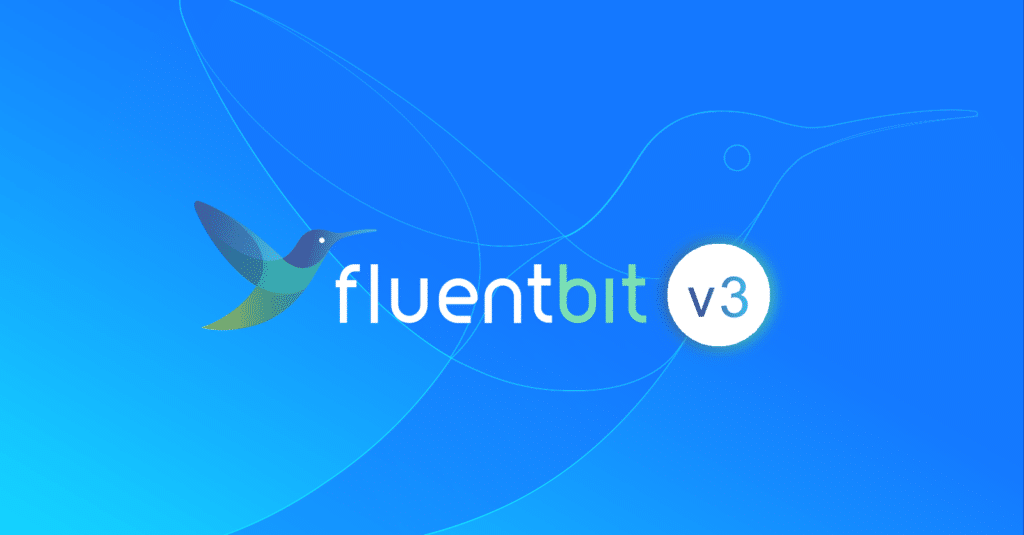Fluent Bit v3 brings new features and improved performance

This week at KubeCon + CloudNativeCon EU in Paris, we are announcing the release of Fluent Bit v3, which includes several new features as well as performance enhancements. The release adds support for:
- New filters for Windows and MacOS metrics.
- New SQL-based processor.
- New and emerging standards such as HTTP/2.
A huge thank you to GitHub, SAP, IBM, Microsoft, Amazon, Google, and other maintainers for their contributions to the Fluent Bit v3 release. We are excited to continue the vision of building the most performant and versatile open source agent for collecting, processing, transforming, and routing telemetry data.
Earlier this month, Fluent Bit surpassed 13 billion downloads from DockerHub — a massive accomplishment demonstrating the acceleration in adoption since it hit one billion just two years ago. Fluent Bit is embedded in major Kubernetes distributions, including those from AWS, GCP, and Azure.
Now, let’s explore some of the new features in more detail.
Metrics filtering gives devops teams more control over their data
In 2022, Fluent Bit added metrics compatibility, including the ability to scrape Prometheus metrics, collect metrics from a host, and route the metrics in either Prometheus or OpenTelemetry format. Since then, we’ve seen wide adoption as companies look to centralize on a single agent for logs and metrics collection at the edge.
With Fluent Bit v3, users can now filter and process metrics before routing them to their OpenTelemetry or Prometheus-based endpoints, giving users greater control over which metrics are prioritized for reporting.
Fluent Bit is known for its powerful ability to process and filter logs in stream, including enrichment, transformation, and reduction, such as removing unnecessary information. With Fluent Bit v3, users can apply aspects of that same filtering and processing to their metrics.
Collecting and processing Windows and MacOS metrics is a major pain point for developers, especially when dealing with these metrics at scale. Fluent Bit v3 helps address this pain by reducing the toolset and the complexity involved. With Fluent Bit’s support for Windows operating system metrics, MacOS system metrics, and process metrics, practitioners can now use a single configuration schema and a single agent on all their client, server, and edge deployments.
SQL processor provides more options for processing data
Fluent Bit provides granular control over processing log data with powerful plugins. Many of the plugins utilize regular expressions (RegEx) to parse the data, which can be difficult due to RegEx’s complexity. With version 3, Fluent Bit adds support for SQL as a processor. Processors were added to Fluent Bit in v2.1.2 and allow users to apply data transformations and filtering to incoming data records before they are processed further in the pipeline.
The SQL processor does not depend on a database or indexing; rather it runs on the streaming data.
HTTP/2 means greater interoperability
The Fluent Bit maintainers are committed to supporting open standards, and with v3 we have added support for HTTP/2. As a result, Fluent Bit can now receive signals emitted over the HTTP/2 protocol, including Prometheus Remote-Write and OTLP.
As organizations increasingly adopt open standards, Fluent Bit’s support for open standards helps ensure that the full observability tech stack works together and that organizations can choose the best tools to fit their needs. Support for HTTP/2 output from Fluent Bit is on the near-term roadmap.
Reasons behind Fluent Bit’s success
Fluent Bit is a lightweight and highly scalable processor and forwarder for logs, metrics, and traces. It is built for cloud and containerized environments and can handle massive volumes of telemetry data created in cloud-native environments. As cloud native applications have become the norm, the adoption of Fluent Bit has grown dramatically.
Fluent Bit’s adoption can be attributed to several factors:
- Designed for cloud native: Microservices are now the defacto architecture for delivering cloud-native applications. With its small memory and CPU utilization footprint, Fluent Bit was created with those environments specifically in mind.
- Built for Kubernetes and containers: Fluent Bit has proven its ability to process large amounts of data efficiently with a super fast, lightweight, and highly scalable footprint. Today, organizations use Fluent Bit to process terabytes of data per day.
- Telemetry data is more important than ever: Enterprises increasingly store and analyze vast amounts of data as part of their observability efforts to reduce application downtime and incident response time.
- Trusted by the major cloud providers: Fluent Bit is deployed in major Kubernetes distributions, including Google Kubernetes Engine (GKE), AWS Elastic Kubernetes Service (EKS), and Azure Kubernetes Service (AKS).
A bit about Fluent Bit’s history
Fluent Bit is a graduated project of the Cloud Native Computing Foundation (CNCF) under the umbrella of Fluentd, alongside other foundational technologies such as Kubernetes and Prometheus. It was initially created to be a lighter-weight version of Fluentd for collecting and forwarding logs from embedded or edge devices where deploying Fluentd would be impractical or even impossible due to limited system resources. It has since evolved and is now capable of collecting logs, metrics, and traces, processing them in mid-stream, and routing them to any number of backends.
Learn more and get involved
To learn more about Fluent Bit, visit the project website or the recently launched Fluent Bit Academy where you will find hours of on-demand training videos covering best practices and how-to’s on advanced processing, routing, and all things Fluent Bit. Here’s a sample of what you can find there:
- Fluent Bit for Windows
- Getting Started with Fluent Bit and OpenSearch
- Getting Started with Fluent Bit and OpenTelemetry
We also invite you to join the vibrant Fluent community. Visit the project’s GitHub repository to learn how to become a contributor. Or join Fluent Slack to connect with thousands of fellow Fluent Bit and Fluentd users who help one another with issues and discuss the projects’ roadmaps.
About Fluent Bit and Chronosphere
With Chronosphere’s acquisition of Calyptia in 2024, Chronosphere became the primary corporate sponsor of Fluent Bit. Eduardo Silva — the original creator of Fluent Bit and co-founder of Calyptia — leads a team of Chronosphere engineers dedicated full-time to the project. Chronosphere is also a silver-level sponsor of the CNCF.






